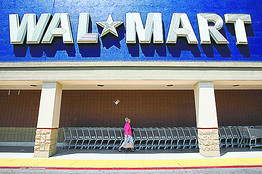By KAREN BLUMENTHAL
Are there any blue-chip stocks left?
Across many industries, the nation's most reliably profitable companies are looking more black-and-blue than blue-chip. Longtime stalwart General Motors Corp. is idling near bankruptcy court. Companies from Alcoa Inc. to Intel Corp. to Wal-Mart Stores Inc. are cutting profit projections.
And while government support has stabilized giant financial concerns like Citigroup Inc. and American International Group Inc., can an entity that's eating at the bailout trough really retain its blue-chip-ness?
The question is entirely serious. Blue chips are the bedrock of our stock portfolios, the shares we most need to believe in. We buy them hoping they will be as safe and solid as any stock can be, freeing us up to chase riskier, higher-yielding investments.
Blue chips got their name in the 1920s when a markets reporter for this newspaper noticed some stocks trading north of $200 a share and compared them to the blue poker chips that then carried the highest value in the game. Over time, the definition evolved to signify large companies that regularly report increasing profits and dividends -- the sorts of shares that small-time investors could buy and forget about.
"Twenty years ago, a stock was considered a suitable blue chip if it was in the Standard & Poor's 500," says Mark M. Adelmann, a portfolio manager at Denver Investment Advisors who helps manage the Westcore Blue Chip Fund.
No more. So many big names have tumbled and the short-term outlook is so dreary that it's hard to have confidence in today's giants of industry. But stock-market professionals believe that there are still a number of blue-chip stocks. Some are relative newcomers, like Cisco Systems Inc. and Intel Corp. But investors shouldn't count out yesterday's favorites. either; AT&T Inc., for one, has endured setbacks in the past but is now on many lists of top stocks. Here's what the market pros look for:
Cash chips: Cash flow -- the ability to generate enough dollars to pay your bills, invest in the business and still have something left over -- remains a classic measure of a company's strength and is often the first place investors look. Rising dividends, a byproduct of strong cash flow, have long been considered a sign of health.
True, Standard & Poor's reported last week that 288 companies cut their dividends in the fourth quarter, making it the single worst quarter since S&P began keeping track in 1956. But 475 companies raised their payouts.
Those with strong cash flow aren't always obvious. Boeing Co. has seen commercial orders fall and is planning cutbacks but has maintained or raised its quarterly dividend for decades now, as has AT&T. Jeremy Siegel, finance professor at Wharton School, has long been a fan of using dividends as an investing strategy and still advocates it. Still, he cautions against chasing the highest dividends -- which could be ripe for an imminent cut. "You should be very, very diversified," he adds.
In addition to cash flow, investors also look for low debt -- and, maybe more important, a low appetite for new debt. Such factors have won technology companies like Google Inc. and Apple Inc. blue-chip honors, even though their stocks are more volatile than those of old-line companies and they eschew dividends.
Macro chips: Along with cash flow and a strong balance sheet, many managers weigh the big economic picture. This has to do with not only the prognosis for the company's business but also its capacity to respond to changing conditions. Derek Young, portfolio manager of the Fidelity Strategic Dividend & Income Fund, says investors need to regularly re-evaluate their holdings. "Markets change, companies change, and opportunities change," he says.
John P. Calamos Sr., chief executive and chief investment officer at Calamos Investments, which owns 97 stocks in its Blue Chip Fund, tries to identify where business is going in the next few years. On the Calamos short list: infrastructure world-wide, health care and the kind of global reach that Nike Inc. and Coca-Cola Co. offer.
Management strength can help in a crisis. True blue chips have managers who have earned investors' trust and "have the integrity to report what you need know to evaluate the business," says Mr. Adelmann of Denver Investment Advisors.
Brand chips: Morningstar, the financial-research firm, looks for companies with a strong competitive advantage -- an "economic moat" -- such as the low prices of Wal-Mart or the market share of Campbell Soup Co. or Microsoft Corp. "No business is in a great position today given the environment," says Paul Larson, a Morningstar equity strategist and editor of the StockInvestor newsletter. But, he says, "if a company has a competitive advantage, it's going to survive a lot longer than a company that doesn't have it."
Big chips: Sheer size may be enough to offer investors some stability. The market, at least in theory, assigns the highest values to both the biggest and the best companies. So market value -- the number of shares times stock price -- is still a good indicator of what investors most believe in.
The Bridgeway Blue Chip 35 Index Fund includes the 26 companies with the highest stock-market value, with the rest chosen for both size and their ability to diversify the index. John Montgomery, Bridgeway's founder, says the 11-year-old index is re-evaluated every two or three years and typically starts with 36 stocks because one is expected to merge or fail.
He says that these big stocks outperform the S&P 500 not only in years when large-cap stocks do well, but also in half the years when small-cap stocks outperform the big ones.
In a way, he says, the 2008 bailouts even underscored the significance of the old reliables. "Uncle Sam stepped in," he notes. "That's one of the reasons they were blue-chip -- they were too big to fail."
- Email: familymoney@wsj.com.





![[poe]](https://webarchive.library.unt.edu/eot2008/20090116003204im_/http://s.wsj.net/public/resources/images/ED-AI858_Poe_C_20090114114647.jpg)
![[Low Fat, Aisle 2: Grocer to Flag Healthful Foods]](https://webarchive.library.unt.edu/eot2008/20090116003204im_/http://s.wsj.net/public/resources/images/PJ-AO077_pjSUPE_C_20090114170441.jpg)
![[How Jazz Helped Civil Right]](https://webarchive.library.unt.edu/eot2008/20090116003204im_/http://s.wsj.net/public/resources/images/ED-AI862_jazzcr_C_20090114214637.jpg)
![[Obama t-shirts]](https://webarchive.library.unt.edu/eot2008/20090116003204im_/http://s.wsj.net/public/resources/images/OB-CY451_0114in_C_20090114130437.jpg)
![[In Cuba, Judaism Becomes Rite of Passage]](https://webarchive.library.unt.edu/eot2008/20090116003204im_/http://s.wsj.net/public/resources/images/OB-CY377_cubaje_C_20090113200440.jpg)
![[Identifying Blue Chips, Post-Meltdown]](https://webarchive.library.unt.edu/eot2008/20090116003204im_/http://s.wsj.net/public/resources/images/OB-CY379_walmar_C_20090113204405.jpg)
![[Web Searches That Really Bear Fruit]](https://webarchive.library.unt.edu/eot2008/20090116003204im_/http://s.wsj.net/public/resources/images/PJ-AO043_pjMOSS_C_20090113130846.jpg)
![[California]](https://webarchive.library.unt.edu/eot2008/20090116003204im_/http://s.wsj.net/public/resources/images/PR-AB248_BLUEPR_C_20090113142619.jpg)
![[Elektra]](https://webarchive.library.unt.edu/eot2008/20090116003204im_/http://s.wsj.net/public/resources/images/ED-AI850_electr_C_20090113121349.jpg)
![[David Swensen]](https://webarchive.library.unt.edu/eot2008/20090116003204im_/http://s.wsj.net/public/resources/images/MI-AU521_SWENSE_C_20090112134143.jpg)
![[airline passenger]](https://webarchive.library.unt.edu/eot2008/20090116003204im_/http://s.wsj.net/public/resources/images/OB-CY217_midsea_C_20090112202455.jpg)
![[Corporate Idol image]](https://webarchive.library.unt.edu/eot2008/20090116003204im_/http://s.wsj.net/public/resources/images/PJ-AO016_pjCORP_C_20090112122855.jpg)
![[Judd, trash]](https://webarchive.library.unt.edu/eot2008/20090116003204im_/http://s.wsj.net/public/resources/images/OB-CY094_Juddfa_C_20090112124927.jpg)
![[The Eye of the Met's Director]](https://webarchive.library.unt.edu/eot2008/20090116003204im_/http://s.wsj.net/public/resources/images/ED-AI845_philip_C_20090112122437.jpg)


Hello
Your question to the Journal Community Your comments on articles will show your real name and not a username.Why?
Create a Journal Community profile to avoid this message in the future. (As a member you agree to use your real name when participating in the Journal Community)